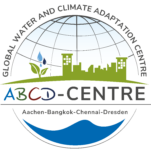CLUSTERS
Take a look on our main research/teaching focus.

Transfer Strategies for Global Water and Climate Adaptation: Traditional Knowledge, Local Economies and Societal Acceptance
Cluster III will contribute to the Global Water and Climate Adaptation Centre by going beyond individual research competencies and their multitude of perspectives: it aims at an inter-and transdisciplinary dialogue on the tangible effects of climate change and environmental degradation. By bringing together renowned scientists and institutions from all project partners and beyond, pressing problems are addressed on a joint and highly visible platform. Thematic events will address global discourses on water security and climate adaptation and involve various local and global stakeholders in a participatory manner. A competence network will be established that is able to consult decision-makers in governmental and non-governmental institutions.The funded Centre Fellows working in Cluster III will be included in the research and outreach activities and play a crucial role in the development of transfer strategies that find the acceptance of local stakeholders and consider their diversity. These fellows and alumni will actively engage in a lasting process of dialogue with stakeholders in society. The competence of scientists involved in Cluster III will be particularly helpful in the establishment of a living lab outlined in this proposal.

Ecosystem Resilience and Nature-Based Adaptation Measures
Nature-based solutions (NBS) receive increased attention due to their capability to contribute to effective climate adaptation on different scales and especially countries of the Global South have included them into their respective Nationally Determined Contributions (NDCs). Ecosystem engineers in the coastal and riverine ecosystems provide a number of provisioning, regulating, supporting, and cultural services. Typical ecosystem engineers in coastal areas are mangroves, reefs, seagrass, seaweed, and dunes. The ecosystem services are regarded to be beneficial in facing future challenges due to climate change. NBS are regarded to be sustainable, environment-friendly, adaptable, self-sustaining, and economical and provide a number of co-benefits. The cluster intends to contribute with fundamental ecosystem research as well as applied approaches in several land-use scenarios with a special emphasis on water-related topics. Results are expected to address coastal hazards, extreme weather events like intense precipitation and droughts.

Water Security, Water Resources Management, Secure Water Supply, And Water Treatment
Cluster I addresses a broad range of water-related research topics and establishes a scientific exchange between leading international scientists from a multitude of disciplinary backgrounds. Based on strong competence in water engineering, the safe water supply for various sectors and climate-resilient infrastructures are important concerns. To work towards these, experts on e.g. water treatment will cooperate with scientists in fields like building technology, economics, and geosciences. Beyond the focus on climate-resilient cities, other climate-adaptation-related problems such as sea-level rise, heat waves, droughts, storms, and their impact on rural agricultural systems are considered.
Working together for the SDGs






